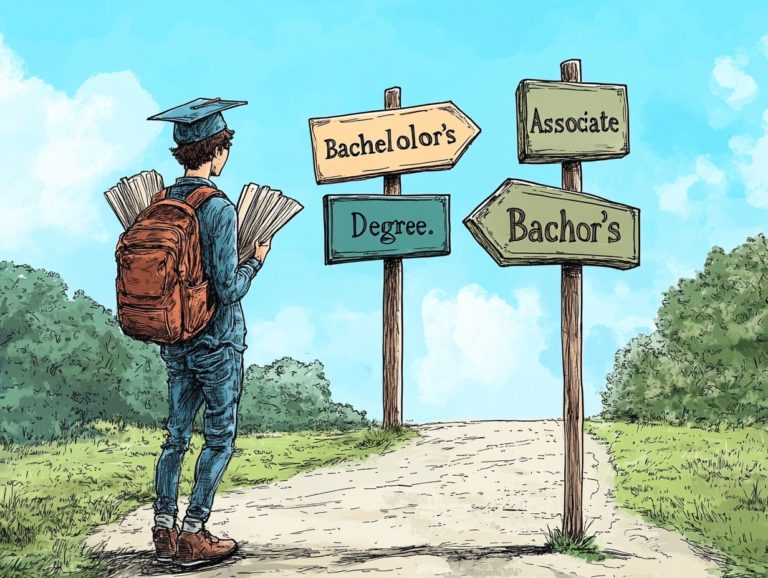Understanding the Admissions Process for Associate Degrees
Are you contemplating furthering your education but feeling uncertain whether a traditional four-year college aligns with your goals? An associate degree might just be the ideal solution for you.
This article delves into what associate degrees are and the different types available. It also covers the benefits they can offer for your career and educational journey.
You ll discover expert tips to help you navigate your admissions experience with confidence.
Let s dive in and explore everything you need to know about pursuing an associate degree!
Contents
- Key Takeaways:
- What is an Associate Degree?
- Benefits of Pursuing an Associate Degree
- Admissions Requirements for Associate Degrees
- Application Process for Associate Degrees
- Financial Aid Options for Associate Degrees
- Tips for a Successful Admissions Experience
- Frequently Asked Questions
- What is an associate degree?
- What is the admissions process for associate degrees?
- Do I need to have a high school diploma to apply for an associate degree?
- What is the difference between an associate degree and a bachelor’s degree?
- Can I transfer credits from an associate degree to a bachelor’s degree program?
- What factors should I consider when choosing an associate degree program?
Key Takeaways:

1. An associate degree is a two-year undergraduate program that offers a variety of specializations and career opportunities. Earning an associate degree can provide numerous benefits, such as a higher salary, transferable credits to a four-year college, and practical skills for the workforce.
Admissions requirements for associate degrees typically include a high school diploma or equivalent, transcripts, and standardized test scores, but may vary by institution.
What is an Associate Degree?
An associate degree is a two-year academic program primarily available at community colleges. It equips you with essential skills and knowledge across various fields.
This credential prepares you to enter the workforce and provides a solid foundation for continuing your education toward a bachelor s degree.
You ll find options like the Associate of Arts (AA), Associate of Science (AS), and Associate of Applied Science (AAS). These degrees are tailored to support various career paths and educational aspirations.
Definition and Types of Associate Degrees
Associate degrees include the Associate of Arts (AA), which emphasizes liberal arts, and the Associate of Science (AS), focusing on applied science. The Associate of Applied Science (AAS) is designed for immediate entry into technical fields.
Each type is tailored to meet diverse educational and career objectives, allowing you to select a pathway that aligns with your aspirations.
If you’re drawn to the AA, you might explore subjects like psychology, literature, or history. This positions you for transfer to a four-year institution or a career in education or communications.
The AS often leads to fields like engineering or healthcare, giving you foundational knowledge for further studies in STEM disciplines.
The AAS focuses on practical skills for direct employment in areas like nursing, information technology, and automotive technology.
Community colleges offer these degrees at an accessible cost, making higher education a viable option for students with varied personal goals whether you aim for immediate workforce entry or see it as a stepping stone to advanced degrees.
Benefits of Pursuing an Associate Degree
Pursuing an associate degree presents many advantages, including improved job prospects and preparedness for the workforce.
You’ll see a notable increase in median income compared to those with only a high school diploma or GED. This degree can also significantly facilitate your career advancement in fields such as nursing, engineering, and applied sciences.
Advantages in Career and Education
The advantages of earning an associate degree are substantial. It offers increased job opportunities and the chance to pursue further education through transfer credits to four-year institutions.
This degree also opens doors to various financial aid options, reducing your tuition costs.
Think of this degree as a launchpad into fields like healthcare, information technology, and engineering technology areas where skilled professionals are in high demand.
For example, you could become a registered nurse or a computer support specialist, both of which often require an associate degree.
Understanding credit transfer policies enables you to transition smoothly into bachelor s degree programs, further enhancing your qualifications and career prospects. Financial aid options, including grants and scholarships for those pursuing an associate degree, can alleviate economic burdens and encourage more individuals to pursue higher education credentials.
Admissions Requirements for Associate Degrees

Admissions requirements for Associate Degrees vary by institution. Generally, you need a high school diploma or a General Education Development (GED) certificate.
Some schools may require placement tests and meetings with an academic advisor to assess your readiness for college coursework.
Common Requirements and Guidelines
Common requirements for Associate Degree programs at community colleges include high school transcripts, standardized test scores, and a minimum GPA. These guidelines differ for full-time and part-time students regarding course load expectations.
As a full-time student, you’ll need to commit to a specific number of credit hours each semester. Part-time status offers more flexibility, allowing you to balance work or family commitments.
Certain programs, like nursing or engineering, often have additional prerequisites or face competitive admission processes. Ensure your application includes all necessary documentation, such as letters of recommendation and personal statements.
Connecting with admissions counselors is important. They can clarify unique requirements and help you navigate the application process.
Application Process for Associate Degrees
The application process for Associate Degrees involves a few key steps.
- Complete an application form.
- Submit essential documents, such as transcripts and test scores.
- Consider applying for financial aid to manage tuition costs effectively.
Step-by-Step Guide to Applying
Applying for an Associate Degree requires organization. Start by gathering necessary documents, completing your application, and consulting with an academic advisor about financial aid options.
Begin with essential documents like high school transcripts, letters of recommendation, and standardized test scores. These elements are vital for a strong application.
After preparing your documents, fill out your application carefully and submit it by the deadline. Accuracy in every section prevents unnecessary delays.
Engaging with academic advisors is invaluable. They can help verify your eligibility and align your goals with available programs.
Understand the financial aid landscape. Familiarize yourself with federal and state aid options, scholarships, and grants. Taking these steps can help secure funding, easing the financial burden of your education.
Financial Aid Options for Associate Degrees
Financial aid for Associate Degrees includes scholarships, federal grants, and student loans. These options enhance accessibility for community college students and relieve the financial strain of rising tuition costs.
Scholarships, Grants, and Loans

Scholarships and federal grants are excellent financial aid options for community college students pursuing an Associate Degree. The best part? You don t have to pay them back, unlike student loans that can lead to long-term financial burdens.
These funds include:
- Merit-based scholarships that celebrate your academic achievements
- Need-based grants designed to support students from underprivileged backgrounds
Your eligibility often depends on factors such as academic performance, financial need, and sometimes even your chosen field of study.
The application process usually requires you to submit transcripts, financial statements, and letters of recommendation. Staying organized and informed is crucial.
Unlike student loans, which can accumulate interest and must be repaid, grants and scholarships offer a break from immediate expenses, helping you avoid the overwhelming burden of debt after graduation.
To manage your financial aid effectively, it s essential to explore all funding sources and stay aware of your overall financial status. This enables you to make informed and strategic decisions about your education.
Tips for a Successful Admissions Experience
To ensure a successful admissions experience for an Associate Degree program, connect with academic advisors early on.
Developing strong study skills, setting clear personal goals, and navigating the application process carefully will help you meet all requirements efficiently.
Advice from Admissions Experts
Admissions experts recommend that as a prospective student seeking an Associate Degree, you should prioritize developing strong study skills and seek guidance from academic advisors. Familiarize yourself with the specific requirements of your chosen community college.
They stress the importance of thorough preparation and proactive research into programs. Students who dedicate time to understanding the curriculum and available opportunities tend to navigate the admissions process with greater success.
For example, one student shared how engaging with an academic advisor not only clarified prerequisites but also unveiled scholarship opportunities that weren t widely advertised.
Building support networks with peers or joining online forums can provide you with essential encouragement and insights, making the often-daunting journey of college admissions more manageable.
Frequently Asked Questions
What is an associate degree?
An associate degree is an undergraduate academic program that typically takes two years to complete. It is equivalent to the first two years of a bachelor’s degree program.
What is the admissions process for associate degrees?

The admissions process for associate degrees generally involves submitting an application, providing transcripts, and meeting any additional requirements set by the specific college or university.
Do I need to have a high school diploma to apply for an associate degree?
Most colleges need you to have a high school diploma or GED to apply for an associate degree program. However, there may be exceptions or alternative pathways for non-traditional students.
What is the difference between an associate degree and a bachelor’s degree?
An associate degree takes two years to complete, while a bachelor’s degree takes four years. Additionally, a bachelor’s degree often requires more general education courses and a higher level of specialization in a specific field of study.
Can I transfer credits from an associate degree to a bachelor’s degree program?
Yes, many colleges have articulation agreements in place that allow students to transfer credits earned from an associate degree to a bachelor’s degree program. Articulation agreements are formal agreements between schools that outline how credits transfer. It s important to check with individual institutions to determine their transfer policies.
For more details, reach out to your academic advisor today!
What factors should I consider when choosing an associate degree program?
Choose an associate degree program carefully. Consider factors like official recognition that a program meets certain quality standards, college reputation, tuition costs, and available student support services.
Make sure the program aligns with your academic and career goals. Don t rush your choice! Picking the right program can shape your future, so take time to weigh your options.






